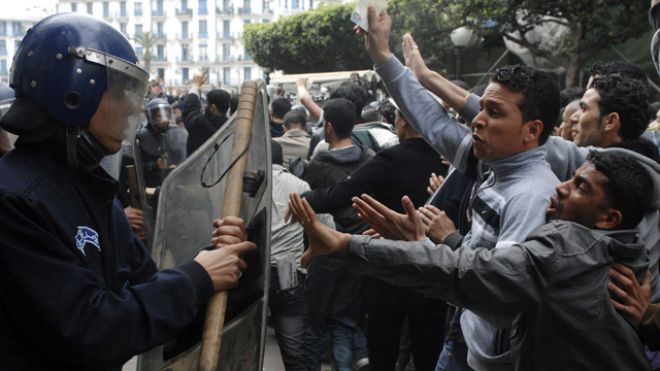Algeria's Minority Group Demands Autonomy, Sparking Stability Concerns of Another Arab Ally
Page 1 sur 1
 Algeria's Minority Group Demands Autonomy, Sparking Stability Concerns of Another Arab Ally
Algeria's Minority Group Demands Autonomy, Sparking Stability Concerns of Another Arab Ally
Algeria's Minority Group Demands Autonomy, Sparking Stability Concerns of Another Arab Ally

The Obama administration could face potential political upheaval with yet another ally in the Arab world, this time in Algeria.
Documents given to members of Congress and obtained by Fox News show that Algeria's largest minority group, the Kabyles, who number up to 10 million, will demand on Wednesday that their government hold a referendum on autonomy. This will be followed by planned demonstrations, which some analysts fear could lead to a brutal conflict and possible uprising -- if the U.S. doesn't act to bring the sides together and work on a mutually acceptable agreement.
Click here to read their demands.
What makes this dilemma particularly difficult for the administration is that the Kabyles, part of the Berber ethnic group, are predominantly secular Muslims and largely pro-Western. They are very active in the fight against Al Qaeda, and even have their own volunteer army to guard against attacks.
Dr Walid Phares, Fox News contributor and author of “The Coming Revolution: Struggle for Freedom in the Middle East,” warns “a confrontation will take place” if nothing is done by the Obama administration.
"Washington must use its diplomacy to create a dialogue between the two parties. If the administration sponsors the dialogue, the chances of heading off the crisis and a potential ethnic conflict would be higher. We must learn from Iraq and Sudan to do a better job in preventive medicine, instead of waiting for the crisis to worsen."
But Phares' warning seems to have so far fallen on deaf ears. Sources tell Fox News that during this week's visit to Washington by Kabyle leaders, requests for meetings with high-ranking officials from the National Security Agency (NSA) and the Pentagon were ignored. The snub comes amid accusations by the Kabyle leaders that the Algerian government is helping the Qaddafi regime stay in power.
They claim Algeria is sending mercenaries, and blocking diplomatic initiatives to unseat him.
The State Department did agree to meet with the leadership, albeit at a lower level. Questions sent to the State Department spokesman were not returned.
Ferhat Mehenni, the president of the Movement for the Autonomy of Kabylia (MAK) and head of the visiting delegation, told Fox News that he has been in touch with the Algerian authorities about the upcoming demonstrations. He said he hopes the government doesn't "commit the same mistake" they did 10 years ago, when Algerian security forces brutally crushed demonstrations that called for an end to government repression and an extension of cultural and linguistic rights. More than 120 people were killed in what is known as the "Black Spring.”
Mehenni says the goal of the trip "is to seek diplomatic support from the U.S. administration and the U.N. to pressure Algeria to accept a referendum for autonomy." He said these will be the same demands the Kabyle will call for in Wednesday’s demonstrations, and beyond.
A former U.S. government official with experience in the region wasn’t optimistic that Mehenni's hope for engagement would be met.
"The Algerian government would totally resist the idea of Kabyle autonomy as leading to the breakup of the Algerian state. Algerian government and army are tough customers, and there is no way they could be jaw-boned or nudged into accepting the idea … There is a reason to be concerned about various aspects of human rights and democracy in Algeria, but far less reason to take on only one aspect of the issue and ignore the rest," he said.
Mehenni said he believes it is in America's best interests to support "our rights to exercise our language, culture, democratic and secular values which we naturally share with the West.”
He also charges that Algeria “encourages the terrorism it is supposed to be fighting. It is scandalous to hear some Western officials describe the Algerian regime as ‘secular.’”
Questions to Algerian officials were not returned. But the website of the Algerian Embassy in Washington D.C. glowingly describes the U.S./Algeria relationship as being "stronger than ever." The website notes Algeria works "very closely with the United States to eliminate the scourge of transnational terrorism."
Despite the lower-level State Department reception, the Kabyle delegation was met warmly by members in Congress on both sides of the aisle. Among them was Rep. Sue Myrick, a North Carolina Republican.
Her spokesperson told Fox News the congresswoman felt it's important "to meet with people from this region as the uprisings continue, so that the U.S. can know their message and intentions, and see what groups the U.S. can work with to ensure that extremists don't gain a greater foothold during these unstable times."
Phares said it would be logical for the U.S. to recognize the rights of the Kabyles and "help moderate a dialogue between the Kabyles and the central government. The Kabyles populations have their own identity and have proven their opposition to terrorism, Al Qaeda and extremism. Besides, their culture is secular, diverse and tolerant. This would be an addition to the camp of moderates in the region. All ingredients in this are positive."
Read more: http://www.rogers-cybernetics.com/fmaxwell/PHProxy/index.php?q=aHR0cDovL3d3dy5mb3huZXdzLmNvbS93b3JsZC8yMDExLzA0LzE5L2FsZ2VyaWFzLW1pbm9yaXR5LWdyb3VwLWRlbWFuZHMtYXV0b25vbXktc3BhcmtpbmctY29uY2VybnMtc3RhYmlsaXR5LWFyYWItYWxseS8%3D#ixzz1yoayYKyr

The Obama administration could face potential political upheaval with yet another ally in the Arab world, this time in Algeria.
Documents given to members of Congress and obtained by Fox News show that Algeria's largest minority group, the Kabyles, who number up to 10 million, will demand on Wednesday that their government hold a referendum on autonomy. This will be followed by planned demonstrations, which some analysts fear could lead to a brutal conflict and possible uprising -- if the U.S. doesn't act to bring the sides together and work on a mutually acceptable agreement.
Click here to read their demands.
What makes this dilemma particularly difficult for the administration is that the Kabyles, part of the Berber ethnic group, are predominantly secular Muslims and largely pro-Western. They are very active in the fight against Al Qaeda, and even have their own volunteer army to guard against attacks.
Dr Walid Phares, Fox News contributor and author of “The Coming Revolution: Struggle for Freedom in the Middle East,” warns “a confrontation will take place” if nothing is done by the Obama administration.
"Washington must use its diplomacy to create a dialogue between the two parties. If the administration sponsors the dialogue, the chances of heading off the crisis and a potential ethnic conflict would be higher. We must learn from Iraq and Sudan to do a better job in preventive medicine, instead of waiting for the crisis to worsen."
But Phares' warning seems to have so far fallen on deaf ears. Sources tell Fox News that during this week's visit to Washington by Kabyle leaders, requests for meetings with high-ranking officials from the National Security Agency (NSA) and the Pentagon were ignored. The snub comes amid accusations by the Kabyle leaders that the Algerian government is helping the Qaddafi regime stay in power.
They claim Algeria is sending mercenaries, and blocking diplomatic initiatives to unseat him.
The State Department did agree to meet with the leadership, albeit at a lower level. Questions sent to the State Department spokesman were not returned.
Ferhat Mehenni, the president of the Movement for the Autonomy of Kabylia (MAK) and head of the visiting delegation, told Fox News that he has been in touch with the Algerian authorities about the upcoming demonstrations. He said he hopes the government doesn't "commit the same mistake" they did 10 years ago, when Algerian security forces brutally crushed demonstrations that called for an end to government repression and an extension of cultural and linguistic rights. More than 120 people were killed in what is known as the "Black Spring.”
Mehenni says the goal of the trip "is to seek diplomatic support from the U.S. administration and the U.N. to pressure Algeria to accept a referendum for autonomy." He said these will be the same demands the Kabyle will call for in Wednesday’s demonstrations, and beyond.
A former U.S. government official with experience in the region wasn’t optimistic that Mehenni's hope for engagement would be met.
"The Algerian government would totally resist the idea of Kabyle autonomy as leading to the breakup of the Algerian state. Algerian government and army are tough customers, and there is no way they could be jaw-boned or nudged into accepting the idea … There is a reason to be concerned about various aspects of human rights and democracy in Algeria, but far less reason to take on only one aspect of the issue and ignore the rest," he said.
Mehenni said he believes it is in America's best interests to support "our rights to exercise our language, culture, democratic and secular values which we naturally share with the West.”
He also charges that Algeria “encourages the terrorism it is supposed to be fighting. It is scandalous to hear some Western officials describe the Algerian regime as ‘secular.’”
Questions to Algerian officials were not returned. But the website of the Algerian Embassy in Washington D.C. glowingly describes the U.S./Algeria relationship as being "stronger than ever." The website notes Algeria works "very closely with the United States to eliminate the scourge of transnational terrorism."
Despite the lower-level State Department reception, the Kabyle delegation was met warmly by members in Congress on both sides of the aisle. Among them was Rep. Sue Myrick, a North Carolina Republican.
Her spokesperson told Fox News the congresswoman felt it's important "to meet with people from this region as the uprisings continue, so that the U.S. can know their message and intentions, and see what groups the U.S. can work with to ensure that extremists don't gain a greater foothold during these unstable times."
Phares said it would be logical for the U.S. to recognize the rights of the Kabyles and "help moderate a dialogue between the Kabyles and the central government. The Kabyles populations have their own identity and have proven their opposition to terrorism, Al Qaeda and extremism. Besides, their culture is secular, diverse and tolerant. This would be an addition to the camp of moderates in the region. All ingredients in this are positive."
Read more: http://www.rogers-cybernetics.com/fmaxwell/PHProxy/index.php?q=aHR0cDovL3d3dy5mb3huZXdzLmNvbS93b3JsZC8yMDExLzA0LzE5L2FsZ2VyaWFzLW1pbm9yaXR5LWdyb3VwLWRlbWFuZHMtYXV0b25vbXktc3BhcmtpbmctY29uY2VybnMtc3RhYmlsaXR5LWFyYWItYWxseS8%3D#ixzz1yoayYKyr

laic-aokas- Nombre de messages : 14024
Date d'inscription : 03/06/2011
 Re: Algeria's Minority Group Demands Autonomy, Sparking Stability Concerns of Another Arab Ally
Re: Algeria's Minority Group Demands Autonomy, Sparking Stability Concerns of Another Arab Ally
http://www.foxnews.com/world/2011/04/19/algerias-minority-group-demands-autonomy-sparking-concerns-stability-arab-ally/

laic-aokas- Nombre de messages : 14024
Date d'inscription : 03/06/2011
 Sujets similaires
Sujets similaires» ChkouN SbabNa [Doula] Usmh _ Group Diamant Noir & Amarilo Negro
» enlarge our group
» Algerie ancien chant kabyle group djurdjura
» Carlyle group , Bush et Ben Laden , une histoire de famille
» Comment les déchets ménagers sont triés par Echalier, filiale de Paprec Group ?
» enlarge our group
» Algerie ancien chant kabyle group djurdjura
» Carlyle group , Bush et Ben Laden , une histoire de famille
» Comment les déchets ménagers sont triés par Echalier, filiale de Paprec Group ?
Page 1 sur 1
Permission de ce forum:
Vous ne pouvez pas répondre aux sujets dans ce forum